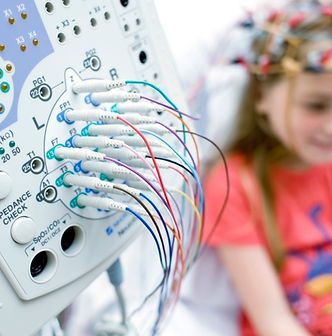
Understanding Delta Waves and Autism: The Benefits of TMS Therapy
- Reign-Bow

- Jul 30, 2024
- 3 min read
Updated: Aug 30, 2024
Parents of children with autism often seek the most effective treatments to enhance their child’s quality of life. One area gaining attention is the impact of brain wave activity, particularly delta waves, on autism. Increased delta wave activity is linked to various negative effects in individuals with autism. Fortunately, stimulation therapy offers promising results by targeting and reducing excessive delta waves. In this blog post, we will delve into the science of delta waves, their impact on autism, and how TMS therapy can be a game-changer for those on the autism spectrum.
What Are Delta Waves?
Delta waves are a type of brain wave with a frequency range of 0.5 to 4 Hz. They are the slowest brain waves and are typically associated with deep sleep and restorative processes. In healthy individuals, delta waves dominate during deep sleep, contributing to physical and mental rejuvenation. However, in individuals with autism, delta waves can be abnormally increased even during wakefulness, leading to various challenges.
The Negative Effects of Increased Delta Waves in Autism
Research has shown that children with autism often exhibit increased delta wave activity, which can have several negative effects, including:
1.Poor Sleep Quality:
Excessive delta waves can disrupt normal sleep patterns, leading to difficulties in falling asleep, staying asleep, and achieving restorative sleep. Poor sleep quality can exacerbate other symptoms of autism, such as irritability and difficulty concentrating.
2.Attention and Focus Issues:
High delta wave activity during wakefulness can interfere with cognitive processes, making it challenging for individuals with autism to maintain attention and focus on tasks. This can affect learning and daily functioning.
3.Behavioral Challenges:
Increased delta waves are linked to heightened behavioral issues, including hyperactivity, impulsivity, and mood swings. These challenges can make it difficult for children with autism to regulate their emotions and behaviors effectively.
4.Cognitive Impairment:
Abnormal delta wave activity can impact cognitive functions such as memory, problem-solving, and decision-making. This can hinder academic performance and daily life skills.
Scientific Evidence on Delta Waves and Autism
Numerous studies have explored the connection between delta waves and autism. For instance, a study published in the journal Brain and Development found that children with autism exhibited significantly higher delta wave activity compared to typically developing children. Another study in the Journal of Autism and Developmental Disorders highlighted that abnormal delta wave patterns were associated with greater severity of autism symptoms.
How TMS Therapy Benefits Those with Autism
Brain stimulation therapy is a form of (TMS) therapy which is a non-invasive, FDA-approved treatment that uses magnetic fields to stimulate nerve cells in the brain. Treatment has been widely used for treating depression and other neurological conditions, and recent research indicates its potential benefits for individuals with autism.
Mechanism of TMS Therapy
Therapy involves placing a magnetic coil near the scalp, which generates magnetic pulses that penetrate the brain. These pulses target specific brain regions associated with delta wave activity, modulating neural circuits and reducing excessive delta waves. The therapy is typically administered in a series of sessions, each lasting about 20-40 minutes.
Benefits of TMS Therapy for Autism
1.Improved Sleep Quality:
By normalizing delta wave activity, therapy can enhance sleep patterns, allowing children with autism to achieve deeper, more restorative sleep. Better sleep quality can lead to improved mood, behavior, and overall well-being.
2.Enhanced Attention and Focus:
TMS therapy can reduce delta wave interference during wakefulness, improving attention span and cognitive function. This can help children with autism perform better in school and daily activities.
3.Reduced Behavioral Issues:
Treatment has the ability to regulate brain wave activity can lead to a reduction in hyperactivity, impulsivity, and other behavioral challenges. This can make it easier for children with autism to manage their emotions and interactions.
4.Cognitive Improvements:
By targeting abnormal delta waves, therapy can enhance cognitive functions such as memory, problem-solving, and executive functioning. This can empower children with autism to develop essential life skills and improve their independence.
Conclusion
Understanding the role of delta waves in autism is crucial for developing effective treatment strategies. Increased delta wave activity can negatively impact sleep, attention, behavior, and cognitive function in individuals with autism. However, therapy offers a promising solution by targeting and reducing excessive delta waves, leading to significant improvements in quality of life.
At Reign-Bow Brain Treatment Center we are dedicated to providing cutting-edge therapy to support children with autism and their families. If you are interested in learning more about how stimulation therapy can benefit your child, please contact us for a consultation.
Together, we can help your child thrive and achieve their fullest potential. 💙
Contact Reign-Bow Brain Treatment Center today to schedule a consultation and discover how our therapy can make a difference in your child’s life.






Comments